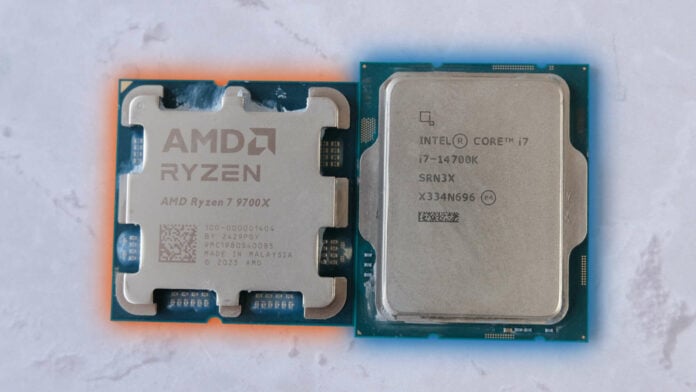With AMD’s Zen 5 knocking about, there’s a new middleweight contender to fight Intel’s Raptor Lake Refresh line-up. However, it has such a large focus on efficiency that it’s tough to tell whether it’s even competing in the same ring.
It’s a battle of the sevens as AMD Ryzen 7 9700X goes up against Intel Core i7-14700K in our latest tests. Fresh application and game benchmarks should point you in the right direction for the best CPU upgrade.
Specs
| AMD Ryzen 5 9700X | Intel Core i7-14700K | |
|---|---|---|
| Cores | 8 | 20 |
| Threads | 16 | 28 |
| TDP | 65W | 125W / 181W |
| L3 Cache | 32MB | 33MB |
| Base clock | 3.8GHz* | 3.8GHz |
| Boost clock | 5.5GHz* | 5.5GHz |
| Launch MSRP | $359 / £340 | $359 / £340 |
AMD has maintained its familiar core and thread count since 2019, which makes for quite the disparity. Granted, Core i7-14700K dedicates just eight cores to performance, leaving it on par with 9700X, but those extra 12 efficiency cores surely make all the difference when it comes to performance.
Instead, Team Red shines with almost half the TDP (thermal design power), saving you sweet pennies on that electric bill. Whether it’s worth the price is another question entirely, as Intel’s mid-range chip has since slipped down to $382 / £365. Perhaps not the loftiest discount after an entire year, but we’ll break down the value below.
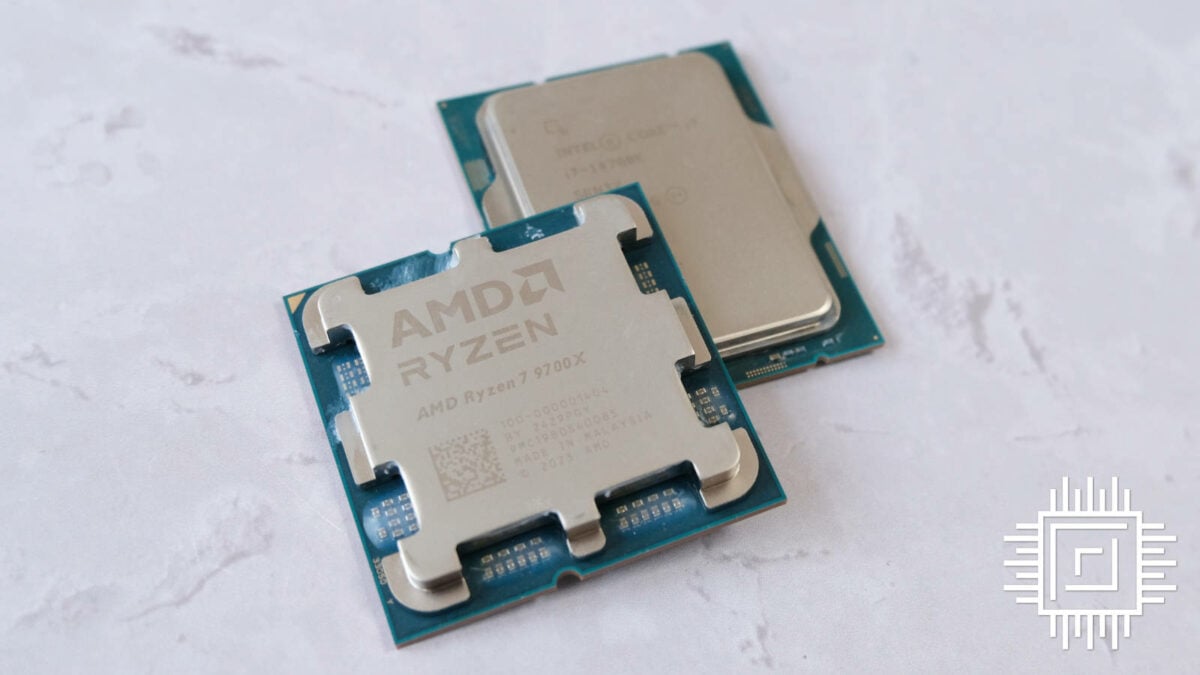
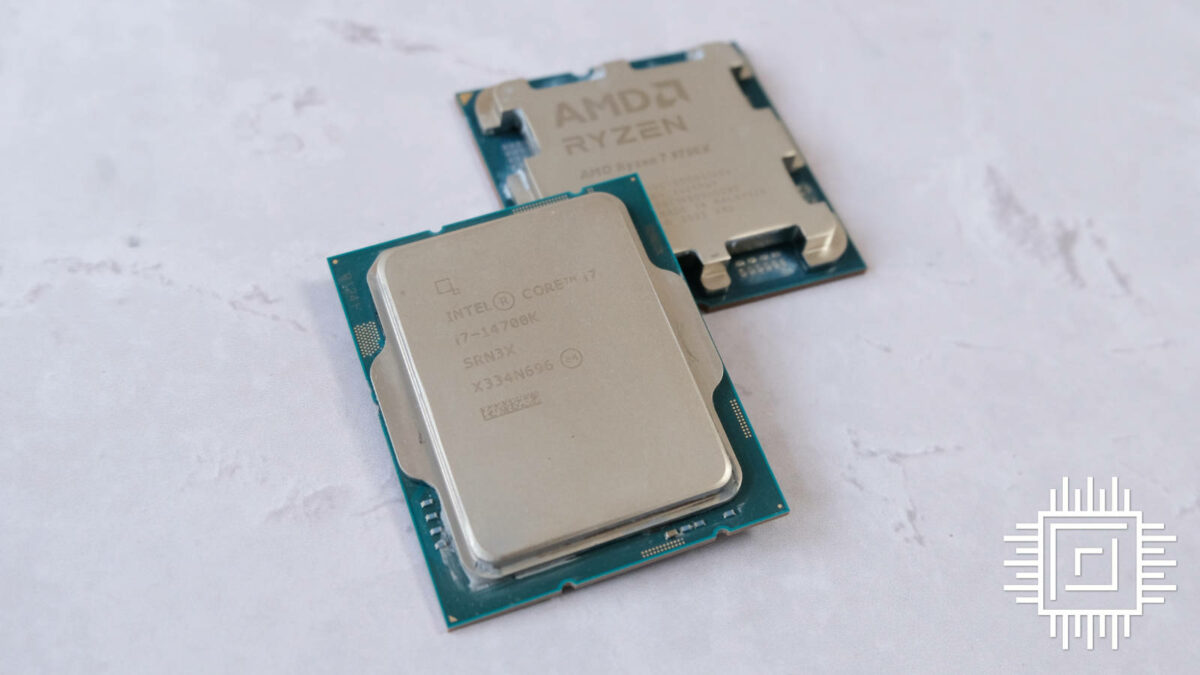
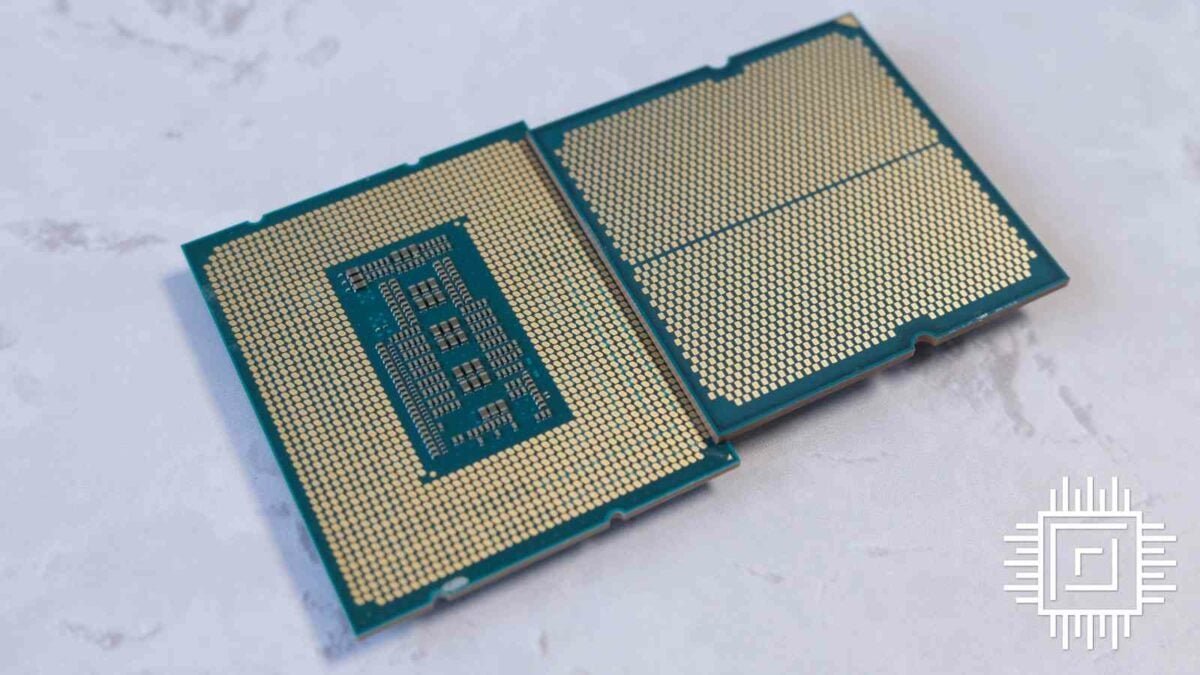
Performance
It’s only fair that we conduct all benchmarks from scratch, sitting our AMD chip on MSI X670E Ace and Intel on ASRock Phantom Gaming Z790 Nova WiFi. Each uses the latest BIOS available and nothing more than the recommended TDPs.
As for the rest of the test bench, the processors are paired with Arctic Liquid Freezer III 420 to cool them, a Zotac GeForce RTX 4090 graphics card, 64GB Kingston Fury Beast DDR5-6000 RAM, and be quiet! Dark Power 13 1,000W for juice.
Productivity

Right off the bat, Intel Core i7-14700K takes the cake with an impressive 65,256MIPS lead in 7-Zip Compression tests. Much of this is owed to the extra power behind it. Depending on your use case, you might be able to forgive 9700X since it demands 48% less for its performance, but it doesn’t make the difference any less distinct.

It’s a tight race between these two chips. Although 9700X gets the edge over its predecessors, it can’t quite muster the effort to overtake its rival. Fortunately, it’s close enough to a dead heat that you likely won’t notice in real-world scenarios.

Zen 5 comes with architectural optimisations that make it a whizz in single-core tasks. In an arm wrestle, 9700X slams 14700K’s hand on the table the moment the count is down.

That said, Intel’s solution is much better in team sports, with all cores working in tandem. One can only wonder how Ryzen might fare with a TDP on par, but it’s noticeably short in multi-core tests.

It’s not surprising AMD’s new CPU storms ahead in Geekbench 6’s machine learning test. After all, generative artificial intelligence has an iron grip on the market. 9700X juggles float32, float16, and int8 data types with ease, proving to be one of the best around.
Rendering

There’s no competition when it comes to 3D rendering. Intel practically yawns as it jogs ahead with 450.2 samples per minute in Blender over AMD’s comparatively meagre 286.4 samples per minute.


Just like before, 9700X excels at single-core but struggles in multi-core applications. The problem here is that it’s near neck-and-neck in the former, while Intel blazes ahead in the latter. Part of it stems from power draw, but the rest is quite simply core count, and more is better.



Those extra cores come in handy for productivity, as Intel stomps in rendering software. AMD takes the lead in Photoshop, but otherwise slips behind with skinnier specs.
Memory



Nothing compares to Intel’s pure bandwidth, leading the charge in AIDA’s read-and-write tests. AMD claws back with better latency, but you’d be hard-pressed to notice at just short of 2ns difference.
Gaming

As our Ryzen 7 9700X review shows, no CPU keeps up with 7000X3D in gaming, but it just about keeps Intel at bay in 3DMark Speed Way. Each processor handles the DirectX 12 Ultimate test like a champ, treating real-time ray tracing and global illumination like they’re nothing.
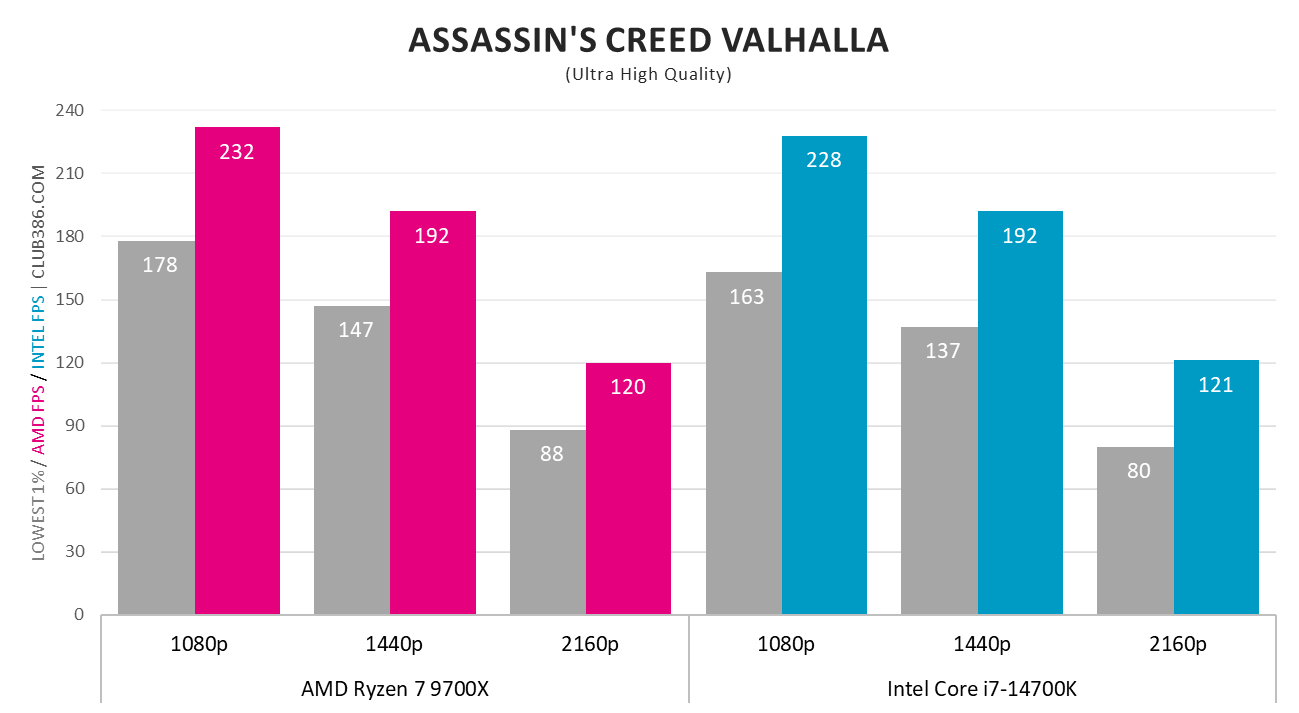
You’ll see virtually no difference in the average frame rate of each chip playing Assassin’s Creed Valhalla at any resolution. 9700X seems to handle the lowest 1% a little better, with dips between 8fps and 15fps higher than its rival.
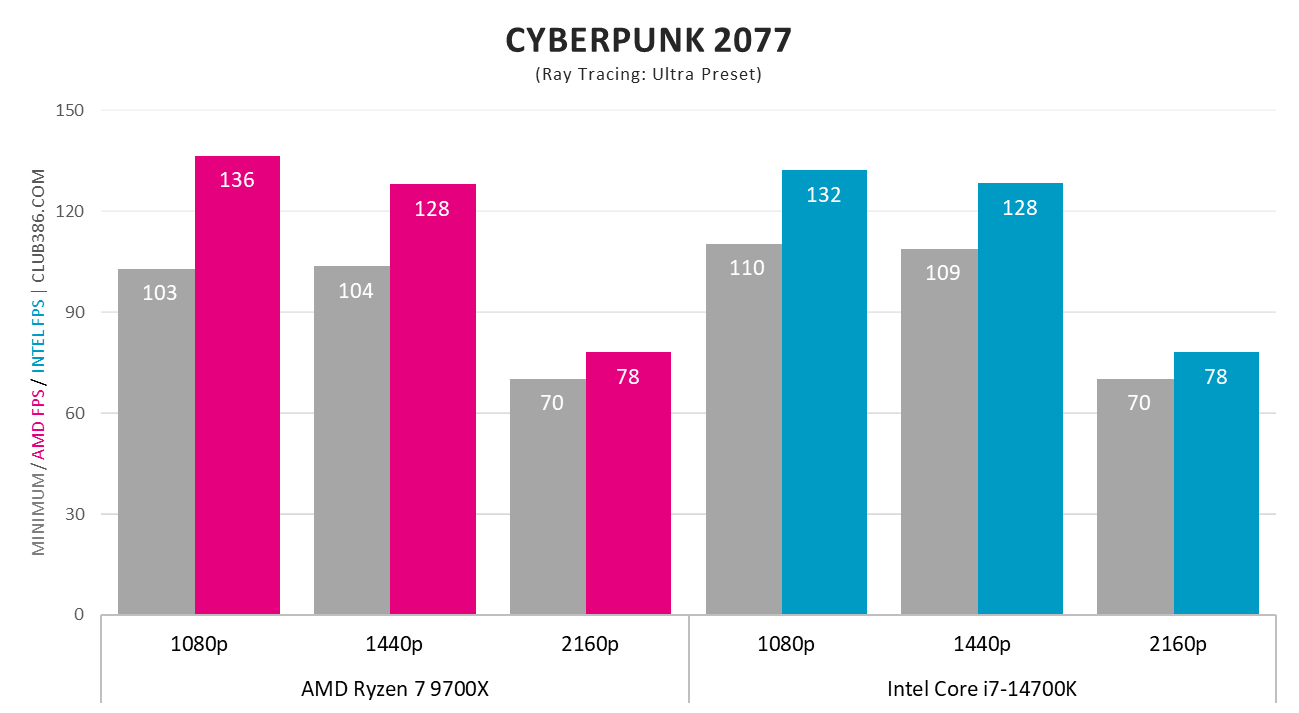
Once again, both models perform remarkably similar. This time, Intel is a touch more consistent, with minimums around 5fps to 7fps higher at lower resolutions. Once you reach UHD, there’s quite literally no difference.
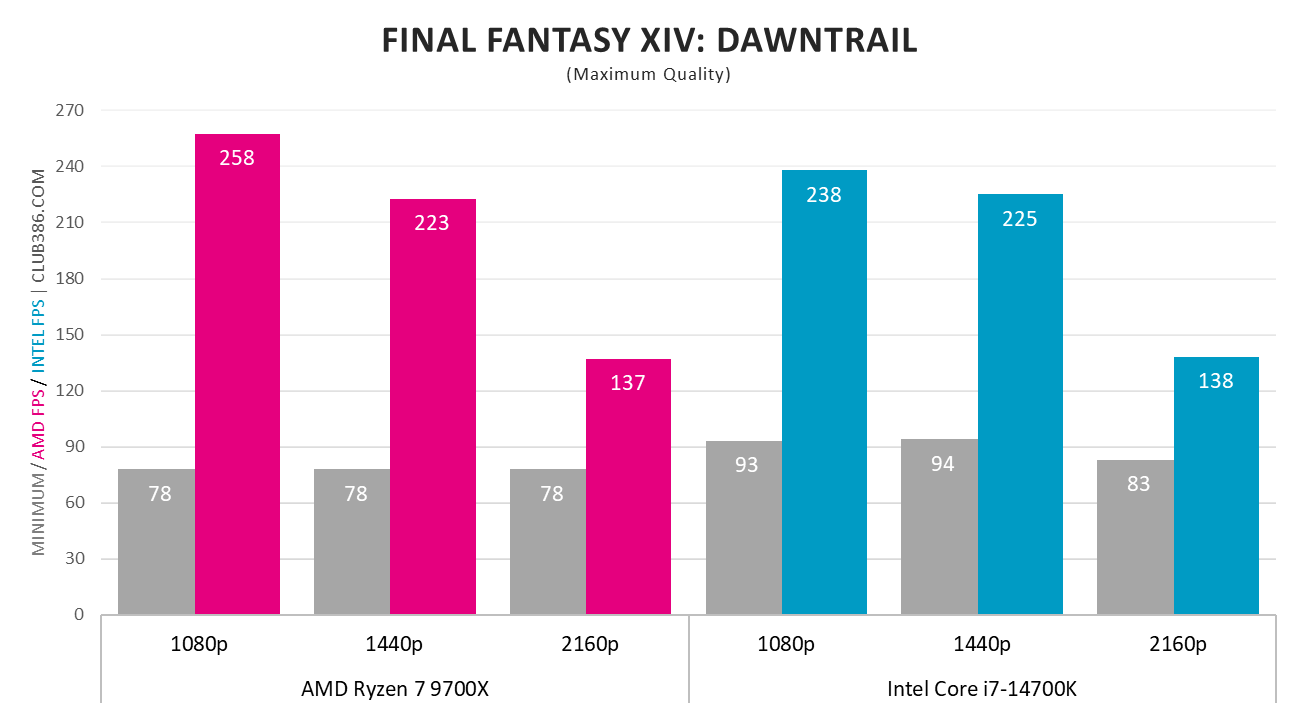
Final Fantasy XIV: Dawntrail favours AMD at HD, as 9700X claims the first lead in average frame rates. 20fps is no small gain, but you won’t see the same leap at resolutions other than 1080p. Meanwhile, Intel doesn’t dip quite as much, with minimums around 5-16fps higher. Truthfully, you’ll notice 130fps drops whenever they happen, regardless of how high the lowest percentiles are, but it still speaks to 14700K’s consistency.
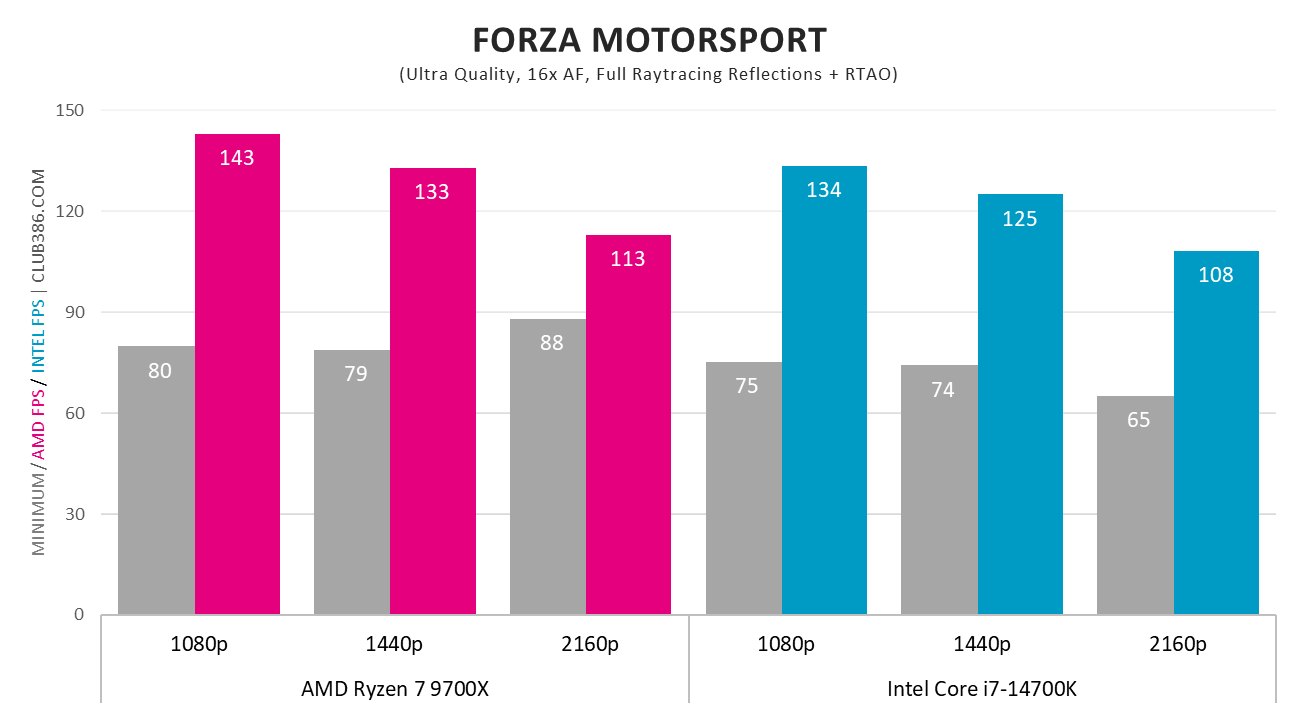
Forza Motorsport quite clearly leans AMD with higher frames all around. It’s not a thrashing, by any means, but the numbers don’t lie when they point between 5-9fps higher across the board.
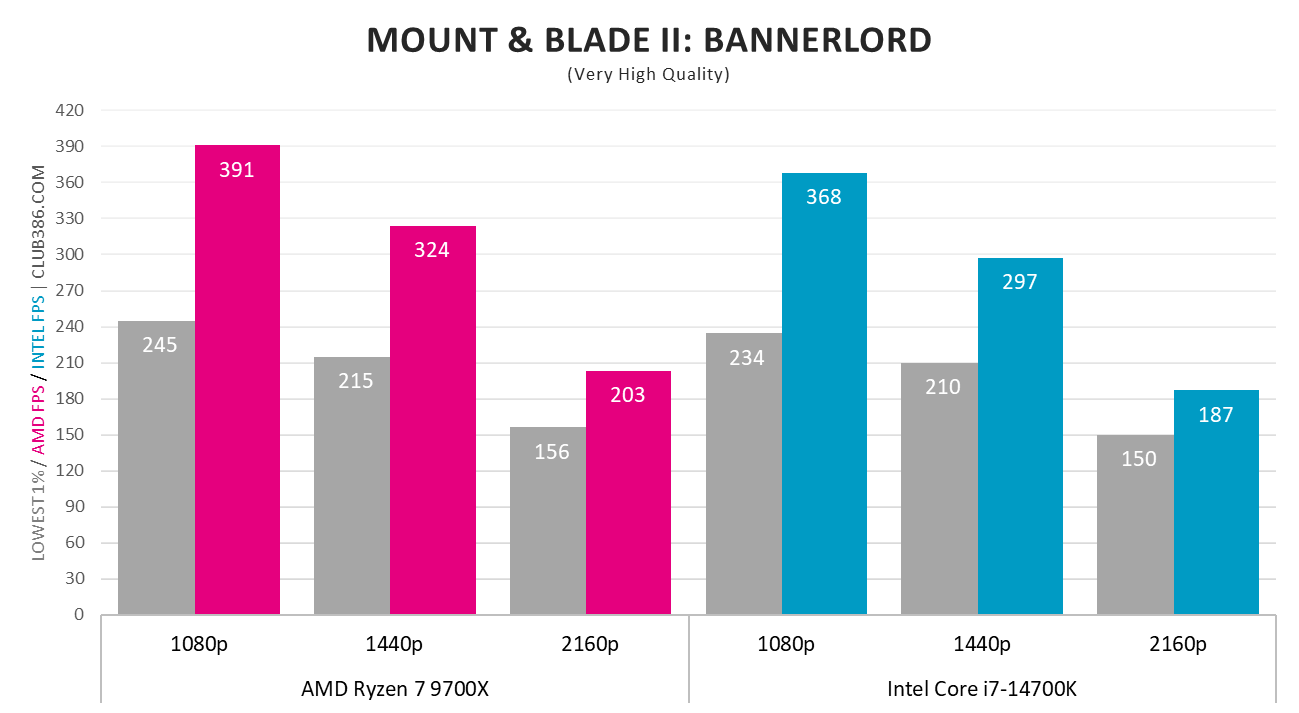
Few games are as good at putting CPUs through their paces as an RTS. Ryzen 7 9700X handles itself well, with noticeably higher frame rates overall. You’ll see a modest jump of 6.25% at 1080p, but things get really interesting with nearly 10% more at 1440p and 8.5% at 2160p. And all of this is without the X3D cache that’ll arrive on 9000 CPUs later down the line.
Efficiency

Efficiency quickly puts all the figures into perspective, justifying 9700X’s lower application performance but making its gaming chops all the more impressive. It asks for 48% less power than 14700K, saving you a noticeable amount on your electric bill. Strangely, idles don’t quite match Intel, but it’s not enough to put a dampener on Zen 5.

Lower power consumption translates to a much lower temperature. 9700X doesn’t put out much heat at 59.8°C under load, while 14700K gets more than a bit hot under the collar at 92°C.
Value

Given its ultra-green approach, it’ll shock nobody to see Ryzen 7 9700X take the crown. We calculate our CPU efficiency rating by dividing our Cinebench 2024 scores by system-wide power consumption. Although AMD lacks in multi-core performance, it requires such little juice to run that it comes out way ahead.

When you divide the Cinebench score by the launch retail price, we get a CPU value rating that doesn’t look great for AMD. Although 14700K cost quite a bit more back in 2023, it still offered more bang for your buck a year ago than 9700X does now. Factor in that Intel’s processor now runs for $382 / £365, and this pushes its value beyond 5.07.
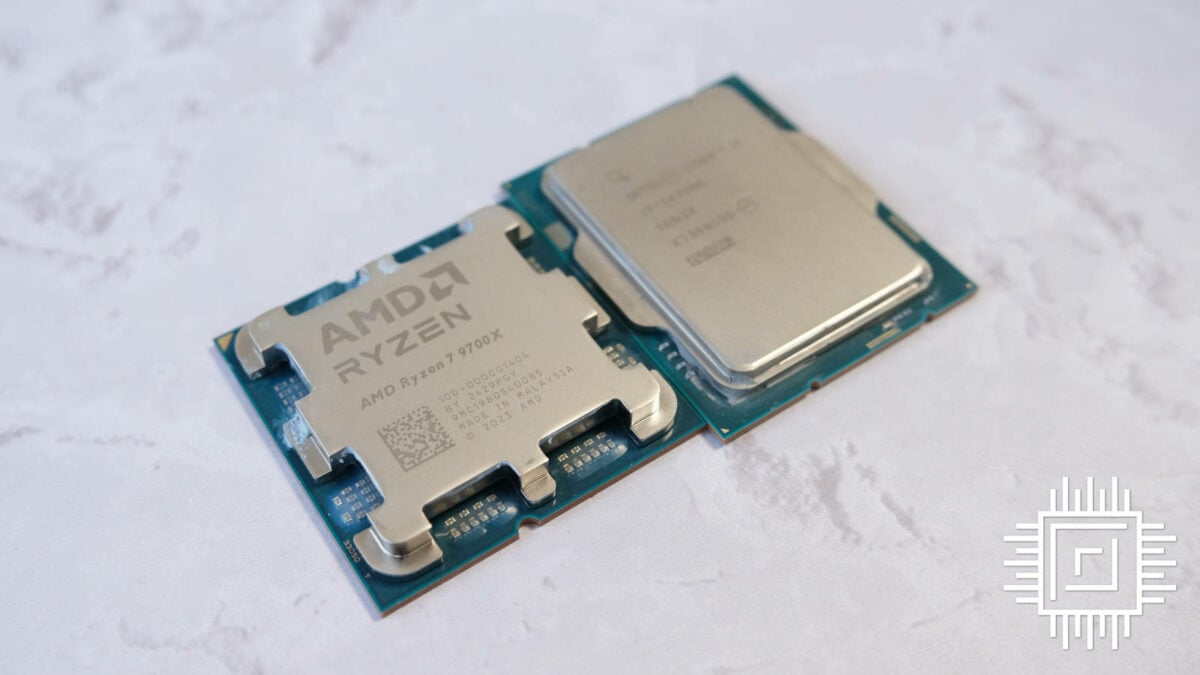
Conclusion
There’s no denying that Zen 5 carries AMD Ryzen 7 9700X to new heights with architectural improvements. It’s clearly the better gaming chip and asks for far less power to run. Still, it doesn’t make the best use of its new foundations, as there’s always the lingering question of how much greater it’d be with more cores.
By comparison, Core i7-14700K gives you far more oomph that’ll shine in productivity. Just keep in mind that while it’s a good deal from the outset, the extra cost of running it will mount up over the years. It’s also worth noting that it’s mixed in with the other 65W Intel chips suffering instabilities, but there are preventative measures thanks to a microcode update and the company has extended warranties to protect you.
Each CPU has its place, but it’s tough to recommend either. Intel will soon replace Core i7-14700K with Core Ultra chips. Since these use a different LGA 1851 socket, there’s no upgrade path once you commit to Raptor Lake Refresh this late in the cycle. Alternatively, 9700X can drop into any existing AM5 motherboards and AMD promises support for years to come, but the processor comes with a lofty launch price. It’s possible the company plans to reduce its $359 / £340 MSRP to combat Arrow Lake in a few months’ time, but it’s a tough call in the here and now.
Check out AMD Ryzen 5 9600X vs. Intel Core i5-14600K to see how the two little brothers compare.
AMD Ryzen 7 9700X
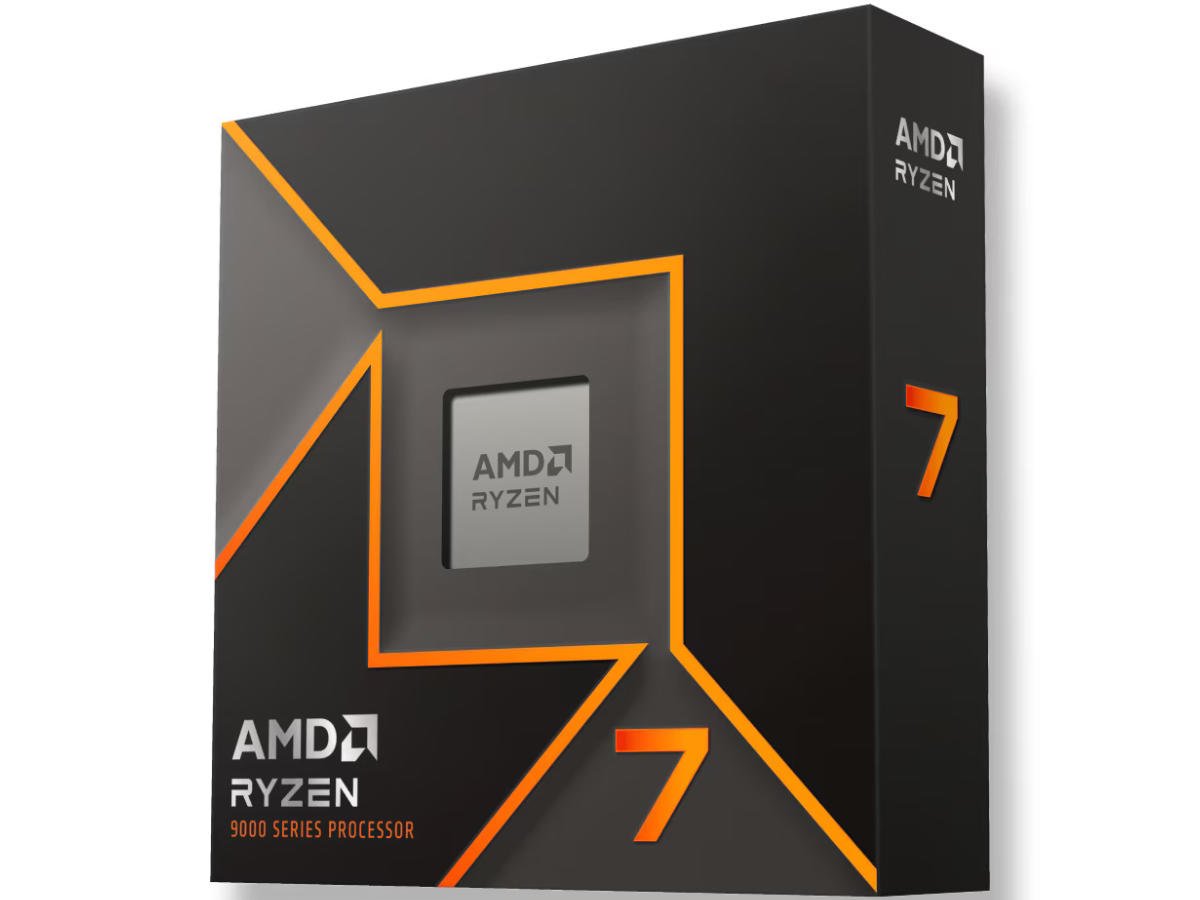
Intel Core i7-14700K
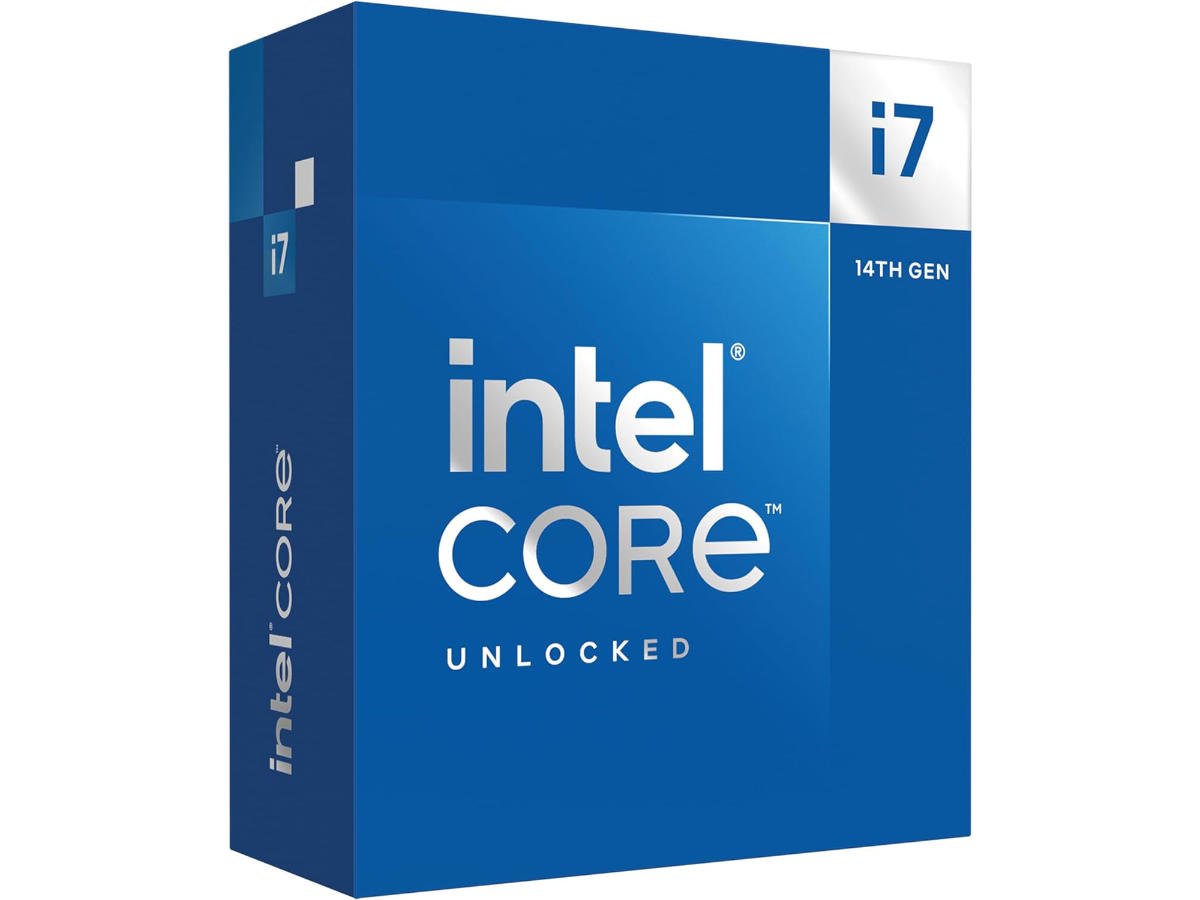
Club386 may earn an affiliate commission when you purchase products through links on our site. This helps keep our content free for all.
Rest assured, our buying advice will forever remain impartial and unbiased.

